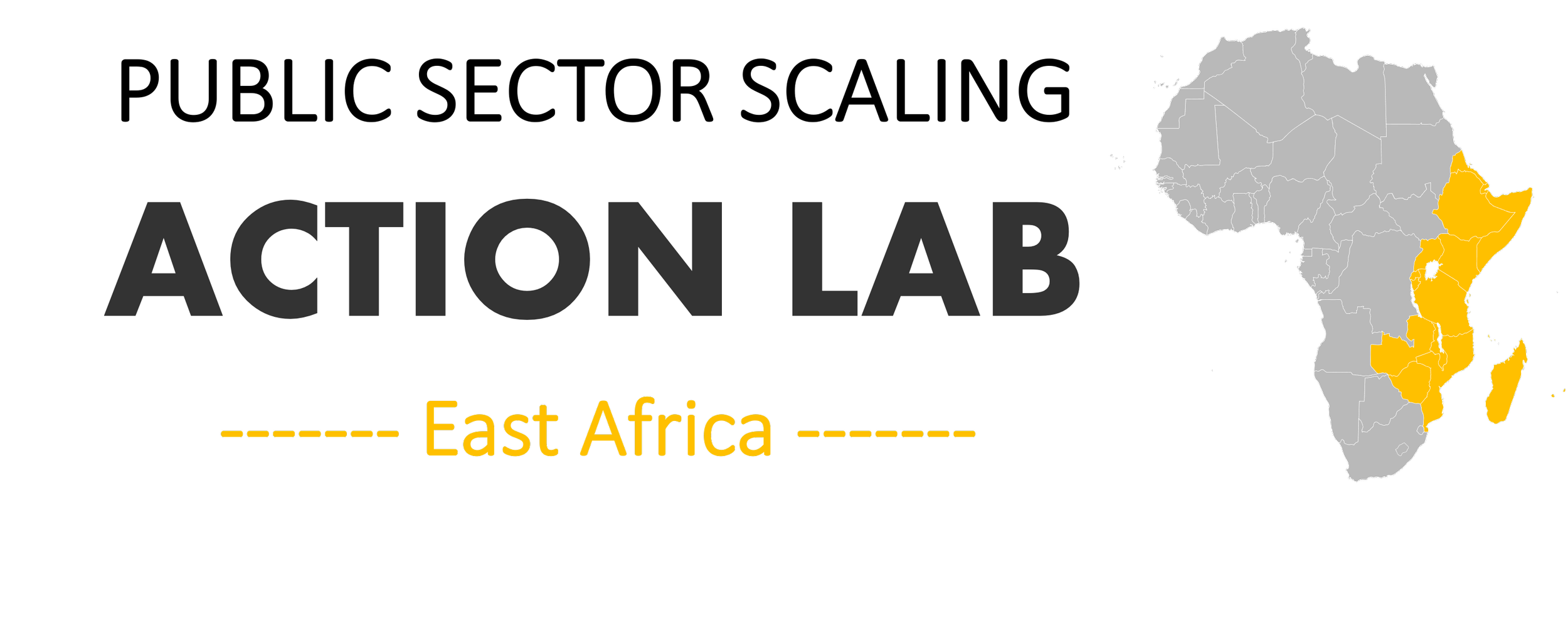Innovation Investment Cases - Exploring a new tool to support Public Sector Scaling
This blog is part of a series developed by Results for Development sharing learning from the design and implementation of a locally-led and demand-driven Public Sector Scaling Action Lab for East Africa. We welcome comments and insights from others working to scale up innovations within government health systems.
Research with government actors across East Africa has highlighted two key barriers that are impeding the successful scale up of innovations within the public sector. First, a lack of successful matchmaking between innovations available on the supply side (the pipeline) and the demand prioritized by governments (which is not always the same as the ‘need’). The second barrier is then a lack of adequate financial / non-financial support to actually enable innovations that match government demand to scale up. Together, these challenges have resulted in a situation where the scale-up of health innovations through the public sector has become highly dependent on the resources (and priorities) of international donors and is the exception to the norm rather than the systematic process that health systems require in order to adapt and respond to their complex and dynamic contexts and patient needs.
In the context of limited and often inflexible budgets, it would be unrealistic to expect that governments are fully able to accommodate the costs of scaling up innovations even when these may be matched to their demand. While international donors have helped to fill some of the gaps, the potential to leverage resourcing available among other parts of government (e.g. the separate capital budgets that many countries maintain, referred to in Kenya as the ‘Development’ budget (1)) and those within the broader innovation ecosystem (e.g. the rapidly growing community of impact investors across Africa) has often been neglected. To enable a more sustainable approach to supporting innovation scale-up, governments need to be able to mobilize other resources and partnerships within their broader ecosystems - which may include international donors but also impact investors and those engaged through increasingly sophisticated public-private partnerships (2).
Unlocking these wider resources and partnerships requires governments to make a strong and clear case for the innovations that they want to invest in, taking into account the incentives of different ecosystem actors / potential partners. One potential tool to help this process could be creating accessible, comprehensive and influential “Innovation Investment Cases” (IICs) - documents that clearly show the benefits of partnering with government on scale-up and that appeal to the interests of potential investors who may have the changing mix of financial and non-financial support that different innovations require. While global investment cases have been created at a high level to support international immunization / vaccine decision-making, these have typically been led by international entities who engage country governments more in the process of signing-up than in designing them in a contextual way sensitive to their particular priorities / needs. Similarly, at the local level many innovators develop content to try and attract support for their solutions from others in their network, but again these are either targeted at market-driven scaling pathways or fail to include government actors and their priorities/needs, which then undermines the likelihood of these solutions being welcomed, co-funded or sustainably integrated within the public sector.
For this reason, the Lab has chosen to focus its experimental work in 2023 on researching, designing and testing a new form of government-owned and driven Innovation Investment Cases. While the format of the Lab’s IICs will be informed by consultation with government and other potential investors, we anticipate that they will clearly lay out some or all of the following:
the current situation as evidence by quality data (need), and the associated problem(s) that the government is seeking to address (demand)
a description of the innovation and how it works, including evidence supporting the innovation’s impact, proof of financial viability, and the specific pathway(s) for its scale-up within the public sector;
the counterfactual consequences of not investing in this innovation (using both quantitative and qualitative scenarios where possible);
the different types of financial (or non-financial support) that sustainable adoption or scale-up within the health system would require;
the value of the requested investment in monetary terms (e.g., productivity losses averted, benefit-cost ratios, etc.) as well as progress that could be achieved in terms of health outcomes (e.g., lives saved); and
the specific amount that government is willing / able to commit as a ‘first-mover’ to attract additional investment, the rationale for investment.
The overall plan is for the PSS Lab team and our country-based Champions to work with selected national and sub-national government actors in Ethiopia and Kenya respectively to co-create two test Innovation Investment Cases (one in each country). Our plan for this is to engage a wide range of government personnel (as well as other actors who are part of the domestic and global investor community) to assess the concept and potential utility of an Innovation Investment Case and co-design a template that we can then use to test the value of this tool for 1-2 specific innovations that the governments are seeking co-funding for. These innovations will be those that have already been prioritized by government or matched to government demand, but which are stalling in the absence of additional support to scale. Once created, the Lab would support the governments in question to then engage their combined networks to socialize the Investment Cases among potential scaling partners in the wider global and national ecosystem, with the hope of catalyzing some engagement and potential investment before the end of 2023.
We’re excited to start this journey and will continue to share learning as we go. If you would like to learn more or support the work of the Public Sector Scaling Action Lab, please contact Michael Nzungi (mnzungi@r4d.org).
(1) For more, see R4D (2021) Enhancing Public Sector Demand for and Scaling of Health Innovation, p22.
(2) See for example BMC Health Services Research (2021) ‘Public-private partnerships in primary health care: a scoping review’ and CDC (2013) An Introduction to Impact Investing in Public Health for a helpful summary of different approaches.
Written by: Thomas Feeny, Michael Nzungi, Paulina Adjei and Anna Giulia Ponchia


